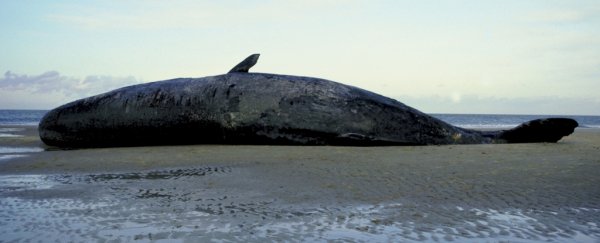Humanity is likely responsible for the death of yet another sperm whale. After it washed ashore Kapota Island in the Wakatobi National Park in Indonesia, park officials found its stomach full of plastic.
Over 1,000 individual pieces were found, including 115 plastic cups, 25 plastic bags, two flip-flops, and a sack containing over 1,000 pieces of string, adding up to 6 kilograms (13.2 pounds) of human trash.
All this plastic refuse had coalesced into a clump in the 9.5-metre (31.17-foot) whale's stomach.
"Although we have not been able to deduce the cause of death, the facts that we see are truly awful," conservationist Dwi Suprapti of WWF-Indonesia told CNN.
However, the plastic trash-lump is a pretty likely culprit. Two other whales - at least that we know of - this year have also washed ashore dead with their guts full of rubbish.
In April, a 10-metre (33-foot) sperm whale was found dead on a beach in Spain, with 29 kilograms (60 pounds) of plastic in its belly, including over 80 plastic bags. On autopsy, biologists concluded that it probably died because it could not digest or expel the plastic, causing an infection of the abdomen.
In June, it was a pilot whale, washing ashore in Thailand with 7.7 kilograms (17 pounds) of plastic in its stomach. Marine biologist Thon Thamrongnawasawat of Kasetsart University in Bangkok told AFP that the plastic probably prevented the whale from being able to digest its food.
According to a study published last year, researchers found that, by 2015, over 8.3 billion metric tons of plastic had been produced by humans since the 1950s. Over 6.3 billion of those tons had been discarded - ending up in landfill or the natural environment.
It's hard to know exactly how much is making its way into the ocean, but a 2015 study found that the figure was up to 12.7 million metric tons in 2010 alone.
And over half of that is coming from just five countries: China, Indonesia, the Philippines, Thailand, and Vietnam. Indonesia is the world's second-highest polluter of ocean plastic, producing a staggering 1.4 million tons of plastic marine debris each year.
If nothing changes, the amount is only going to rise, resulting in the destruction of more magnificent marine life.
The Indonesian government has pledged $1 billion annually towards reducing its plastic waste problem, but that's probably cold comfort to a whale that literally choked to death on garbage.
